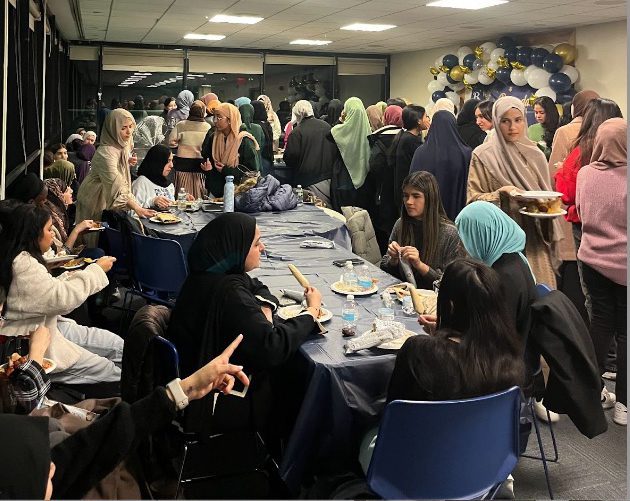
Despite over 330 attendees cramming into just two rooms on the Hunter College campus, both were silent at sunset as rows of people kneeled to the ground in prayer, or Maghrib as it is known in Islam.
While a significant amount of the Hunter student population is Muslim, finding community in a commuter school, especially during the holy month of Ramadan, can be a challenge. To help Muslim students find solidarity and compassion, the Pakistani Student Organization (PSO) on March 25 helped students and faculty find space for prayer and food to break their fast, in a ceremonious practice referred to as Iftar.
The Vice President of the PSO, Tehseen Naqvi, said the decision to host an Iftar event was due to the “significance of Ramadan within the Pakistani Muslim community and beyond.”

“Ramadan is not merely a period of fasting; it is a time of spiritual reflection, renewal, and communal solidarity,” said Naqvi, a junior studying Biology. “It serves as a reminder of the importance of self-discipline, empathy, and charity, encapsulating the essence of Islam’s teachings.”
The end of Ramadan, which falls on April 10 this year, is Eid al-Fatir.
At 7 p.m., men and women, or called “brothers and sisters” in the promotional flyers for the event, formed a line. The men were assigned to the Thomas Hunter Game Room, while the women were in the Hunter West Faculty Dining Room.
The first 30 minutes involved everyone getting situated in the right place and initiating the prayer. Once completed, brothers and sisters eagerly lined up for an assortment of South Asian cuisine, including all-too-known delights such as butter chicken, naan, and a variety of curries. As attendees waited in line for food, board members passed out a popular South Asian ice cream delicacy known as kulfi.

“One of the beautiful things about fasting is being able to break your fast and remember all the struggles that you went through, and be grateful for the meal that’s in front of you,” said Nabiha Subzwari, the club’s digital marketing director. “In Islam, you get a lot of benefits for breaking your fast together.”
Once attendees were able to fill their plates, they rushed to sit at tables lined with ivy branches, lights, and plates full of dates, as it is said that Prophet Muhammad ate dates to break his fast.
“May peace be upon him,” said Subzwari, in reference to the prophet.
Others, like freshmen Fatima Nawac, chose to sit and chat in a circle with friends.
“It feels like home with all the people you’re around,” Nawac said.

Putting together the event was not easy, the organizers said. With just a team of 13 club members aiding over 300 attendees, Naqvi said despite the “chaos of midterms and rigors of fasting, they poured their heart and soul” into arranging (and booking) the prayer spaces, catering food from a vendor and promptly serving it to fasting students.

Some of the challenges were coordinating purchases of food and decorations with budget constraints, securing approvals from Undergraduate Student Government, Public Safety and the Office of Student Activities, and other logistical intricacies.
For some students, being able to rejoice in Iftar on their campus alongside their peers holds significance to their identity. While Muslim students are able to use the MSA room in Thomas Hunter to conduct prayers, cultural organizations like PSO bridge together ethnic and religious identity such as Pakistani-Muslims.
“Having a club like PSO, you get to not only meet other Pakistani or Muslim students, but students who are interested in the culture,” said Subzwari about finding community in a commuter school like Hunter. “I think it’s such a beautiful way to learn about others.”
Naqvi said she hopes that the event’s success will inspire positive changes at Hunter for Muslim students, and continue to foster deeper connections within the “resilient and determined” community.
“Through our collective efforts, we have not only celebrated the rich cultural heritage of Ramadan, but also embodied its core values of compassion, generosity and solidarity,” Naqvi said.
At the end of the evening, brothers and sisters slowly left their rooms. But following them were the sounds of laughter, echoing throughout the empty halls of Hunter.


